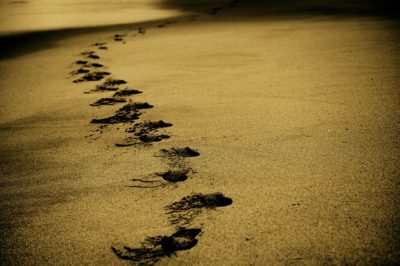by Vani Viswanathan
Vani talks about how thinking of individuals as being on their different journeys could help her deal with the chaos around her – and be a little kinder.
A few days ago, I got into an altercation with an old man in an e-rickshaw. I had requested him – politely, I made sure – to reduce the volume of whatever he was watching on his phone without his earphones. He turned it off with a huff, asked me why I wouldn’t mind my own business. I managed to hold my anger and tried to find the words in Hindi to explain the concept of triggering – the video he was playing had a woman screaming her lungs out in distress, which caused me extreme discomfort. I wanted to convey why such loud sounds may disconcert people, but I was lost on him: he proceeded to ask if he could ask me to ‘leave this space’ because he didn’t like my face or what I was wearing. Soon we descended into a loud argument that only ended when he got down.
I was upset about yelling at an old man and how, despite my firm belief that I was on the right side, I was having to face the emotional distress after the incident while the man seemed to have gotten away with his rude remarks. As I thought about it over the next few days, I realised that I’d tried to tap on a concept that may be alien to him – that of triggering. Sure enough, the old man was unjustified in making personal remarks about me, but would he have reacted differently if he was aware that some people might feel distressed when listening to some sounds? Did he understand that being in public demanded certain ways of behaving (in this case, not loudly playing something)? Did he know that using his age to make rude and disrespectful remarks against a younger woman wasn’t appropriate? Some of these seemed obvious to me, but I also wondered if I was expecting too much from him. Since I thought that I seemed to know ‘better’ than him, maybe the responsibility was on me to have reacted to the loud video differently – by trying to get out of the situation somehow, for instance.
The idea of individual journeys has been on my mind a lot recently. By that, I mean the paths each of us take to get to a point of understanding or awareness. For those of us who are able to, should we reflect whether we always know what we know today – were we ‘born’ with that knowledge? Or did our upbringing or experiences facilitate us in acquiring this knowledge? How easy was it to acquire? Some of us are blessed with families or institutions that make this somewhat easier – say, the idea of diversity in the way people dress, love, be. For some of us, education, or the right company, travel or reading aided that process. In essence, a multitude of factors came together for us to know things and to learn new ways of thinking and seeing and to accept these. We forget that what is now basic or obvious for us was built due to privilege, hard work and access to a variety of experiences. Can everyone easily access these factors to arrive at the same point of understanding, though?
I have come to see that when I don’t value these different journeys of people, I don’t give them the benefit of doubt when they do something contrary to my position, especially on things that matter to me, say on feminism or following traffic rules. I feel that I have the right – or even responsibility – to call out those who are doing something wrong, especially where it affects me, and where I felt safe enough to do so, have often yelled at bad drivers, at people spitting or littering on the road, asked men staring at me why they were doing so, and so on. In the e-rickshaw case, I called out the old man for what I thought was poor behavior in a public space.
Fair enough, a lot of times people on the ‘other side’ don’t seem to deserve this kindness of benefit of doubt. Since I’m most invested in discussions around feminism, I can vouch that it feels absolutely satisfying to call out a sexist person, brand or a film. Heck, I used to do this quite frequently a few years ago, believing that those who couldn’t understand the ‘basic’ ideas of equality or respect don’t need to be treated with kindness or respect. But with time, wisdom(!) – and some experience in conducting trainings on topics like gender and sexuality – I realised that as much as something seems ‘basic’ to me, the converse is, for someone else. As such, to expect them to drop their viewpoint, one that they have built with a journey unique to themselves, is ridiculous. So I’ve come to see that getting riled up is rather pointless, an exercise that might at best get the other person defensive and worse, get me frustrated and sometimes pushed to angry tears.
What’s helped me, therefore, is to think that each of these people is in a particular moment in their journey that I have no clue of. Perhaps the old man in the e-rickshaw was dealing with a tough situation and watching a woman scream gave him some relief (I’ll never know how!) Maybe the motorcyclist honking incessantly while driving on the wrong side of the road doesn’t give two hoots about traffic laws for whatever reason. The people who’ve parked their cars on the footpath near my place perhaps think they’re entitled to it because they believe the government should have allotted parking space for them; maybe they’ve even fought for it but resigned to not getting it and therefore parked on the footpath. I will never know these journeys, and since I don’t have the time or willingness to find out, maybe there’s no point to fighting it.
This hasn’t been easy for me, because I believe that I have to stand up for what’s right in my own, small ways – without this belief, I may have no business working in the development sector (I am, of course, talking about situations that involve me as an individual, and not things like activism against laws or governments or so on). And I’m not really excusing willful ignorance or disrespectful and abusive behavior. A person’s journey, after all, has real-life implications on how they treat others, and this causes grief and sometimes actual, physical, wounds. Which is why I have more questions than answers. For instance, I don’t know if I should just stand back if someone attacks my deeply-valued beliefs, or my personal space, or behaves in a way that causes me harm and distress, even if by something as ‘simple’ as not following traffic rules.
But I do know that it might help for me to take a step back whenever I get agitated upon meeting an opposing viewpoint. To remember that each of us has our different journeys, and that often, we all won’t reach the same perspective towards a topic. Perhaps this awareness will make me kinder, and encourage me to find other ways to channel my energies to be heard or get justice. It could disabuse me of the notion that I have the burden to confront wrongdoing. Perhaps this will also help me realise that some things simply won’t happen the way I want them to – like that Indian drivers will never follow lane discipline! – and give me the strength and wisdom to move on. The line that comes to mind (for which I can’t find a single source) is ‘It’s more important to be kind than right.’ Easier said than done, but recognising individual journeys may be a far more humane framework with which to treat myself and others, one that doesn’t belittle my mental health.
Vani Viswanathan writes fiction and non-fiction, and works on gender, sexuality and development communications in New Delhi. Her first dedicated foray into writing for the world was when she started a blog in 2005. Her writing typically focuses on the marvellous intricacies and laughable ironies in lives around her. She draws inspiration from cities she’s lived in or visited. Her writing can be accessed on www.vaniviswanathan.com.







I like how you’ve detailed your mental anguish. Your ‘right’ actions resulted in an outcome that caused you discomfort. Should you take the burden upon yourself and continue to believe that you are ‘right’? Or should you stop performing those actions because it caused your ‘discomfort’? These conflicting choices leads to anguish. We often fail to observe and describe thoughts (in great detail) that cause anxiety and conflict within our minds. I like how the piece befittingly talks about ‘kindness’ being the best response. In expressing your anguish through words you practice kindness towards yourself.